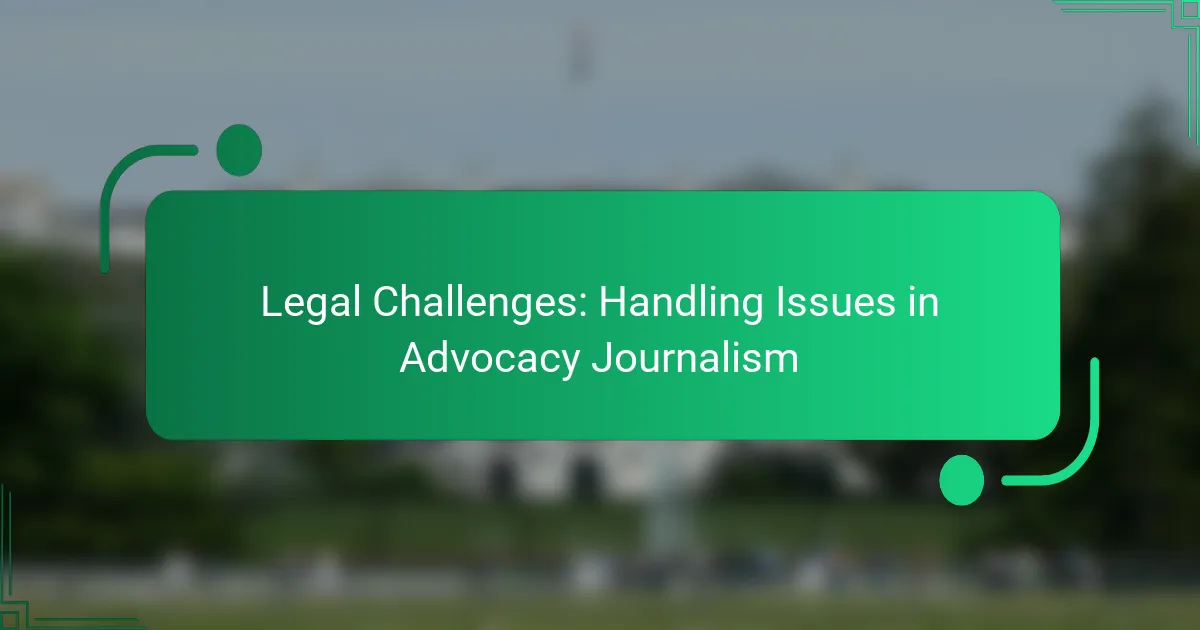Advocacy journalism plays a crucial role in highlighting social issues, but it often faces significant legal challenges such as defamation claims and invasion of privacy. To navigate these hurdles, journalists must understand relevant laws and utilize resources like shield laws and media liability insurance. By implementing protective strategies and seeking legal guidance, they can ensure their reporting remains ethical and compliant while effectively advocating for change.
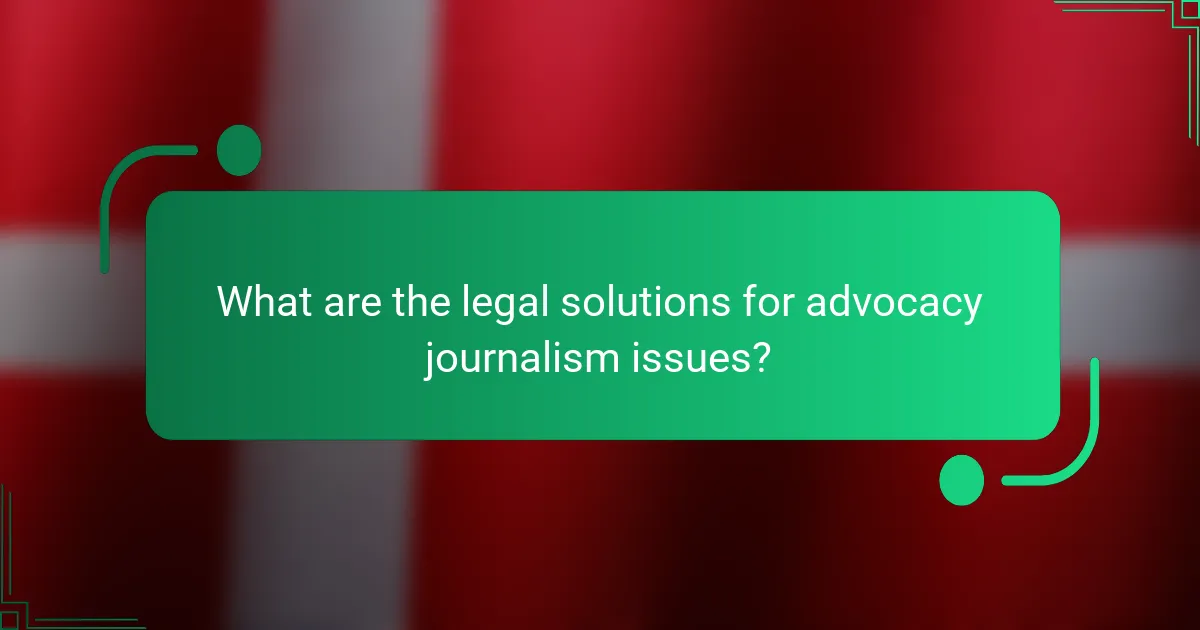
What are the legal solutions for advocacy journalism issues?
Legal solutions for advocacy journalism issues include understanding defamation laws, utilizing shield laws, obtaining media liability insurance, and seeking support from legal aid organizations. These resources help journalists navigate potential legal challenges while protecting their rights and responsibilities.
Defamation laws
Defamation laws protect individuals and organizations from false statements that could harm their reputation. For journalists, it’s crucial to ensure that any claims made in their reporting are accurate and well-supported to avoid legal repercussions. Familiarizing oneself with local defamation laws can help mitigate risks.
In the U.S., for instance, public figures must prove actual malice to win a defamation case, while private individuals need only show negligence. Understanding these distinctions can guide journalists in their reporting practices.
Shield laws for journalists
Shield laws provide journalists with legal protection against being compelled to reveal their sources or unpublished information in court. These laws vary by state and country, so it’s essential for journalists to know the specific protections available in their jurisdiction.
In the U.S., about 40 states have some form of shield law, which can help journalists maintain confidentiality and protect sensitive information. However, these laws are not uniform, and some jurisdictions may have exceptions, especially in criminal cases.
Media liability insurance
Media liability insurance protects journalists and media organizations from claims related to defamation, copyright infringement, and other legal issues. This type of insurance can cover legal fees and damages, providing a financial safety net for advocacy journalists.
When considering media liability insurance, evaluate different policies based on coverage limits and exclusions. Costs can vary widely, but investing in this insurance can be crucial for those engaged in high-risk reporting.
Legal aid organizations
Legal aid organizations offer resources and support for journalists facing legal challenges. These organizations can provide legal advice, representation, and assistance in navigating complex legal issues related to advocacy journalism.
Many legal aid groups focus on media rights and freedom of expression, offering workshops and resources tailored to journalists. Connecting with these organizations can be a valuable step for journalists seeking guidance and support in their advocacy efforts.
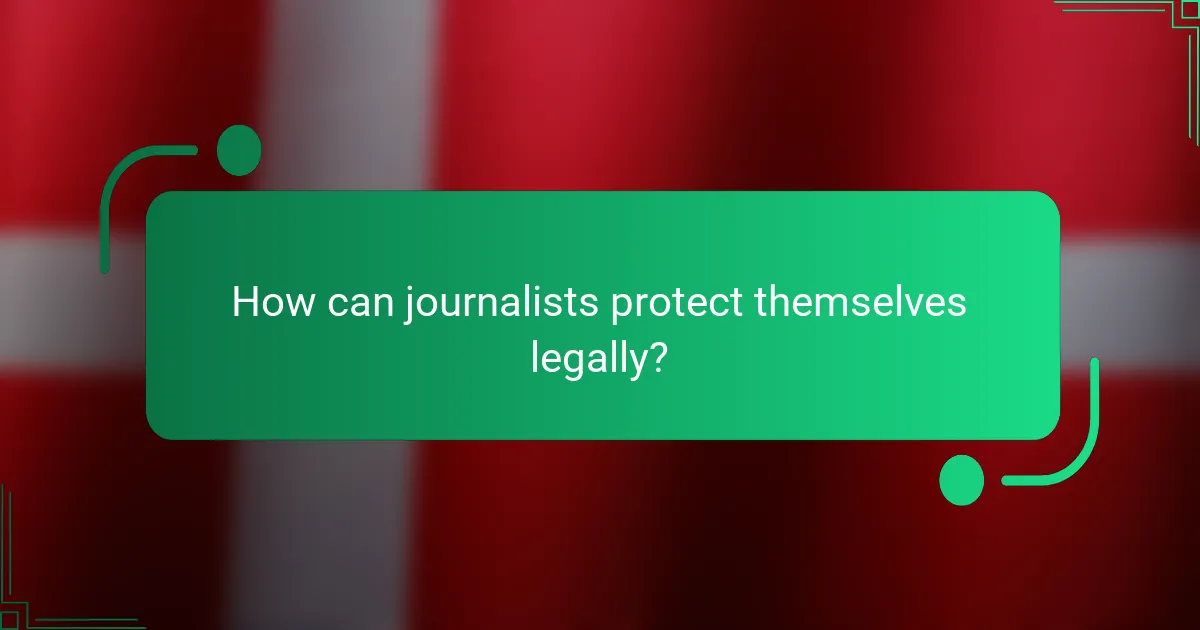
How can journalists protect themselves legally?
Journalists can protect themselves legally by understanding relevant laws, using disclaimers, and consulting legal experts. These strategies help mitigate risks associated with advocacy journalism, ensuring that reporting is both ethical and compliant with legal standards.
Understanding copyright laws
Copyright laws are crucial for journalists as they govern the use of original content. Journalists should familiarize themselves with how copyright applies to text, images, and videos to avoid infringement. For instance, using a photo without permission can lead to legal action.
It is essential to know the difference between fair use and copyright infringement. Fair use allows limited use of copyrighted material without permission for purposes like criticism or news reporting, but the boundaries can be ambiguous. Always consider the purpose, nature, amount, and effect of the use on the original work.
Using legal disclaimers
Legal disclaimers serve as a protective measure for journalists by clarifying the nature of the information presented. Including disclaimers can help manage audience expectations and reduce liability, especially when reporting on sensitive topics.
For example, a disclaimer might state that opinions expressed in an article are those of the author and do not necessarily reflect the views of the publication. This can help shield the journalist from potential defamation claims.
Consulting legal experts
Consulting legal experts is a proactive step for journalists to navigate complex legal landscapes. Engaging with a lawyer who specializes in media law can provide valuable insights into specific legal challenges that may arise in advocacy journalism.
Journalists should consider establishing a relationship with a legal advisor who can review content before publication, especially when dealing with potentially controversial subjects. This can help identify legal risks and ensure compliance with applicable laws and regulations.

What are common legal challenges faced by advocacy journalists?
Advocacy journalists often encounter several legal challenges that can hinder their work. These challenges include defamation claims, invasion of privacy, and disputes over access to information, which can significantly impact their ability to report effectively.
Defamation claims
Defamation claims arise when a journalist publishes information that damages a person’s reputation. Advocacy journalists must ensure that their reporting is accurate and well-sourced to avoid potential lawsuits. Even unintentional errors can lead to costly legal battles, so it’s crucial to verify facts and provide context.
To mitigate risks, journalists should consider obtaining legal advice before publishing sensitive material. Keeping records of communications and sources can also help defend against defamation claims if they arise.
Invasion of privacy
Invasion of privacy occurs when journalists disclose private information about individuals without consent. Advocacy journalists should be cautious when reporting on personal matters, as this can lead to legal repercussions. Understanding the boundaries of public interest versus private life is essential.
To avoid privacy violations, journalists should focus on information that serves the public good and seek permission when necessary. Being transparent about the purpose of the reporting can also help in navigating these sensitive issues.
Access to information disputes
Access to information disputes often arise when journalists seek public records or data that government entities may withhold. Advocacy journalists should familiarize themselves with local freedom of information laws to effectively challenge such denials. Knowing the legal framework can empower journalists to request necessary documents confidently.
When facing access issues, journalists can file formal requests and, if denied, consider appealing the decision. Building relationships with public officials can also facilitate smoother access to information, enhancing the quality of their reporting.
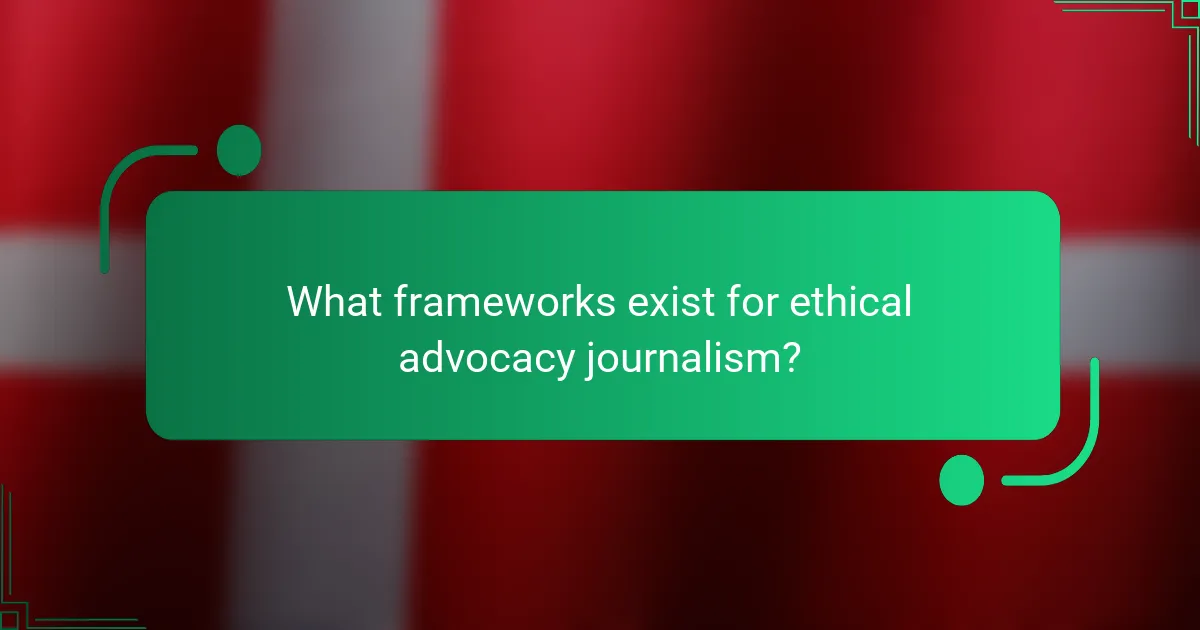
What frameworks exist for ethical advocacy journalism?
Ethical advocacy journalism operates within established frameworks that guide journalists in balancing advocacy with factual reporting. These frameworks help ensure that the pursuit of social justice does not compromise journalistic integrity or accuracy.
Society of Professional Journalists Code of Ethics
The Society of Professional Journalists (SPJ) Code of Ethics emphasizes the importance of seeking truth and reporting it. Journalists are encouraged to provide a fair and comprehensive account of events, ensuring that their advocacy does not overshadow factual accuracy.
Key principles include minimizing harm, acting independently, and being accountable. For example, a journalist advocating for environmental issues should present scientific data alongside personal narratives to maintain credibility and objectivity.
International Federation of Journalists guidelines
The International Federation of Journalists (IFJ) provides guidelines that promote ethical standards in advocacy journalism globally. These guidelines stress the need for journalists to respect the rights of individuals and communities while advocating for social change.
Journalists should ensure that their work does not exploit vulnerable populations. For instance, when covering human rights abuses, it is crucial to obtain informed consent from subjects and avoid sensationalism that could further harm those involved.
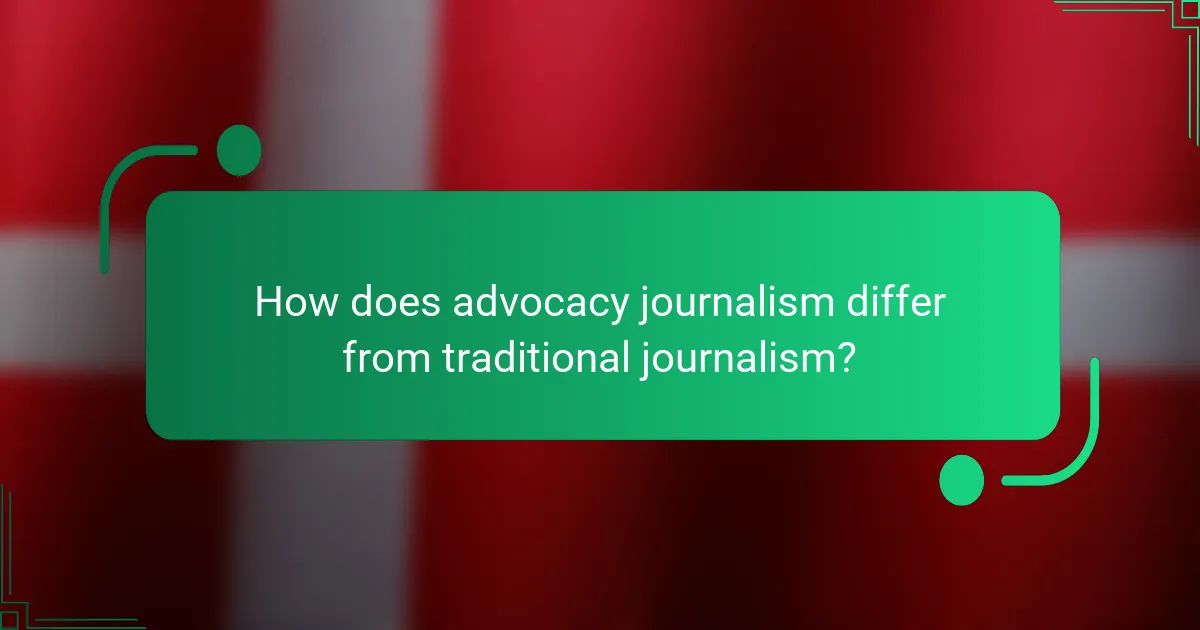
How does advocacy journalism differ from traditional journalism?
Advocacy journalism focuses on promoting specific causes or social issues, while traditional journalism aims for objectivity and impartial reporting. The key difference lies in the intent; advocacy journalism actively seeks to influence public opinion and policy, whereas traditional journalism strives to present facts without bias.
Focus on social justice issues
Advocacy journalism often centers around social justice issues such as human rights, environmental concerns, and economic inequality. Journalists in this field highlight systemic problems and push for reforms, using their platforms to raise awareness and mobilize support. For instance, coverage of climate change may not only report on events but also advocate for policy changes to address environmental degradation.
When engaging with social justice topics, journalists should ensure their reporting is grounded in thorough research and credible sources. This enhances the legitimacy of their advocacy and helps avoid potential backlash from critics who may question their motives or accuracy.
Engagement with marginalized communities
Engaging with marginalized communities is a cornerstone of advocacy journalism. Journalists often work closely with these groups to amplify their voices and experiences, ensuring that their stories are told authentically. This can involve participatory methods, where community members contribute to the storytelling process, fostering a sense of ownership and empowerment.
To effectively engage with marginalized communities, journalists should prioritize building trust and understanding local contexts. This may include attending community meetings, collaborating with local organizations, and being sensitive to cultural nuances. By doing so, they can produce more impactful narratives that resonate with both the community and a broader audience.
